The biggest problem with Life is that the film is largely lifeless.
Life is the story of the iconic photographs of James Dean taken by photographer Dennis Stock in the run-up to the release of East of Eden in March 1955. At that point, Dean was a young actor on the cusp of stardom. As the premiere of East of Eden approached, Dean still aspiring towards his definitive role in Rebel Without a Cause. Dennis Stock saw something in the young actor, believing he might capture a moment of cultural change in the brooding young actor.
Even if they didn’t make the cover of Life magazine, Stock’s photographs have come to define Dean in the popular memory. These photographs capture Dean at his most brooding and his most joyous, capturing the extremes of his experience. Snapping Dean walking through the rain in Times Square or reading comics with his brother, Dennis seemed to trap some of the essence of the actor in his work. Life centres on the complicated relationship that exists between the two men, as they attempt to get a read on one another and navigate the taut waters of celebrity.
However, for a film inspired by (and derived from) an instantly recognisable set of photos, there is something just a little bit too staid about Anton Corbijn‘s two-hour long character study. It feels like a loose selection of pop psychology strung around some faithful recreations, missing the vibrancy and the intimacy that made those shots so distinctive.
There is an obviousness to Life that is somewhat distracting. The film feels like it offers a rather superficial examination of a complicated relationship. Life plays to the myth of James Dean, the charming and intelligent young man who was always awkward with celebrity. Dane DeHane gets to do a lot of melancholy brooding over the course of Life, as the film meditates on a young man who wanted to be an actor rather than a celebrity. There is a sense of Dean as an exploited quantity, a talent manipulated and abused by those who see him as a stepping stone.
It is very much a generic portrayal of young artistic talent, the artist who has finds themselves caught up in a commercial system. Life reinforces the idea that fame isolated Dean from the real world, disconnecting him from what really mattered to him as he was surrounded by those individuals quick to leverage him for their own success. Girlfriend Pier Angeli trades in Dean for a more high-profile prospect; Jack Warner bullies and manipulates Dean to promote his movie; even Dennis Stock is transparently manoeuvring to raise his own profile.
Life is incredibly heavy handed in its portrayal of these relationships. “You have to play the game,” Dean’s manager advises the young actor at one point. On the publicity circuit for East of Eden, Dean is asked towards what he might aspire. He answers, “I want to do good acting.” The script for Life treats Dean as a venerated font of wisdom, a good-natured and talented idealist utterly ill-equipped for the wider world. There is no nuance or exploration, no shading or sophistication. As presented by Life, James Dean feels more like the platonic ideal of James Dean.
The script goes to the other extreme in its handling of Dennis Stock. Stock is transparently manipulative and selfish. He is very clearly and callously interesting in using Dean to get his photographs into Life magazine. The script goes out of its way to emphasise Stock’s almost comical degree of self-interest. When travelling to meet Dean’s family, Stock does not pry the relevant information out of Dean with small talk or feigned interest. Asking about the family’s religious belief, his self-interest is paramount, “Is there anything I need to know?”
Any relationship between a character like Dean and a character like Stock is going to be complicated and wade in issues of exploitation. After all, Dean has something toward which Stock aspires; he has success and security, fame and credibility. However, Life never adds any nuance or detail to this relationship. Instead, most of the second half of the film is given over to incessant reminders of how parasitic and voyeuristic the press can be when dealing with celebrities. It is a well-worn refrain, one that Life keeps hitting over and over again.
To be fair, the actors do what they can with the material. Dane DeHaan captures the brooding and contemplative side of Dean quite well, providing an effective contrast to the actor that many know through his film work. At the same time, there is a sense that DeHaan’s performance lacks the charisma that defined James Dean. Life only really offers a few fleeting glimpses of the charming and feckless young man who captured the spirit of youth. The film is structured so that the audience never gets to see DeHaan properly channel that appeal.
Robert Pattinson does the best that he can with a rather one-note character. While DeHaan has the opportunity to play off the familiar screen persona of James Dean so as to provide contrast, the character of Dennis Stock is not iconic or familiar enough to extend beyond the few notes afforded to him by the script. Stock is desperate and pathetic, but never in a way that feels vital or urgent. Pattinson teases the idea of a man uncomfortable in his own skin, but Stock frequently comes across as a stock movie paparazzi.
Anton Corbijn‘s direction is disappointingly uninspired, particularly considering the source material. James Dean is an instantly recognisable American icon, providing a wealth of imagery with which a biography might play; the great (and daunting) thing about a biography focused on an actor is the fact that there is already a wealth of material out there that will inform and colour the audience’s impression of the character. All the director has to do is simply draw on that tangled web of iconography to create something novel or inspired.
Life has the advantage of actually drawing from imagery. Life is not a biography of an actor or a photographer, it is essentially a filmatic history around a set of distinctive visual cues. Life doesn’t have to come up with any truly iconic images, because history (or Dennis Stock) has already provided them. In theory, all Corbijn has to do is to figure out a way to translate the spirit of those distinctive still images into a two-hour film. It is not an easy task, but Cobijn is starting with some good material. So it is disappointing that Life feels so flat and so generic.
To be fair, there are undoubtedly practical limitations at play here; trying to recreate fifties New York on the budget of an independent film is no easy task. However, there is something very drab in the way that Corbijn attempts to emulate that classic look and feel. The big shot here is the one set in Times Square, one of the most emotive and evocative images of Dean. However, the film resorts to television-level trickery; two actors shot tight on an obviously tight set posing for the front of Astor Theatre before panning out to obvious green screen for the money shot.
Life feels like a disappointingly shallow film. Although shot in desaturated colour, it feels more black and white than the pictures which inspired it.
Filed under: Non-Review Reviews | Tagged: Dane DeHaan, film, James Dean, Life, Movie, non-review review, review, Robert Pattinson, robert pattison |















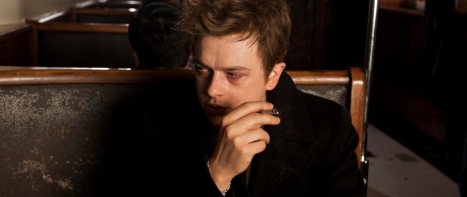
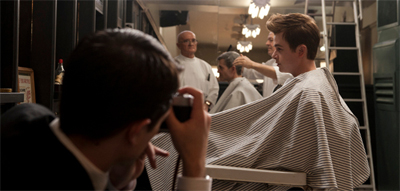
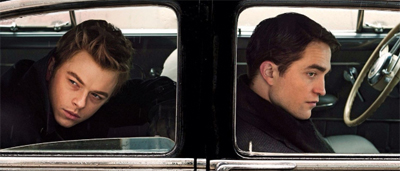
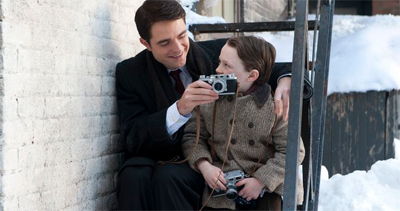
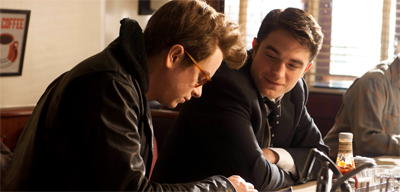

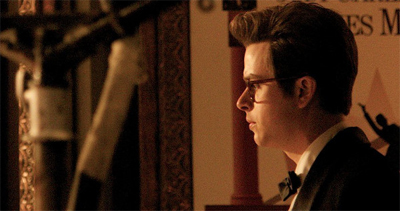





If you’d told me about five years ago that Robert Pattinson would have steadily evolved into an incredibly interesting actor I never would have believed it. Yet here we are. He won’t ever be a truly magnetic actor, but with movies like Cosmopolis, this and the fantastic The Rover, Pattinson has shown a willingness to take on odd roles with interesting film makers. I really enjoy watching Pattinson now. I’d be willing to almost gamble he might becomes a DiCaprio style lead at some point. Life doesn’t really work for the reason laid out here but I found Pattinson to be a fun presence and it was nice to see Dane Dehann play a role other than “annoying and stressed out”. Life is relatively inert but the leads make it worth a casual watch
I’d agree with most of that. Although I think Radcliffe has done a much better job of reinventing himself than Pattinson, because of the sheer randomness of his choices. I couldn’t see Pattinson doing Horns, What If?, The Woman in Black or a BBC movie about GTA.
Radcliffe has done a great job reinventing himself. I’d probably rate Pattinson’s transformation a little higher because Daniel Radcliffe was always great even as a little kid in the early Harry Potter movies. Radcliffe becoming a fascinating lead is also eased by the fact that he has so much money he can literally afford to make GTA movies and stuff like Horns for the rest of his career. Pattinson went from being a bland lifeless joke of an actor into kind of becoming someone that’s actually capable of elevating something in need of energy like Life. Daniel Radcliffe is probably the better actor of the two though.